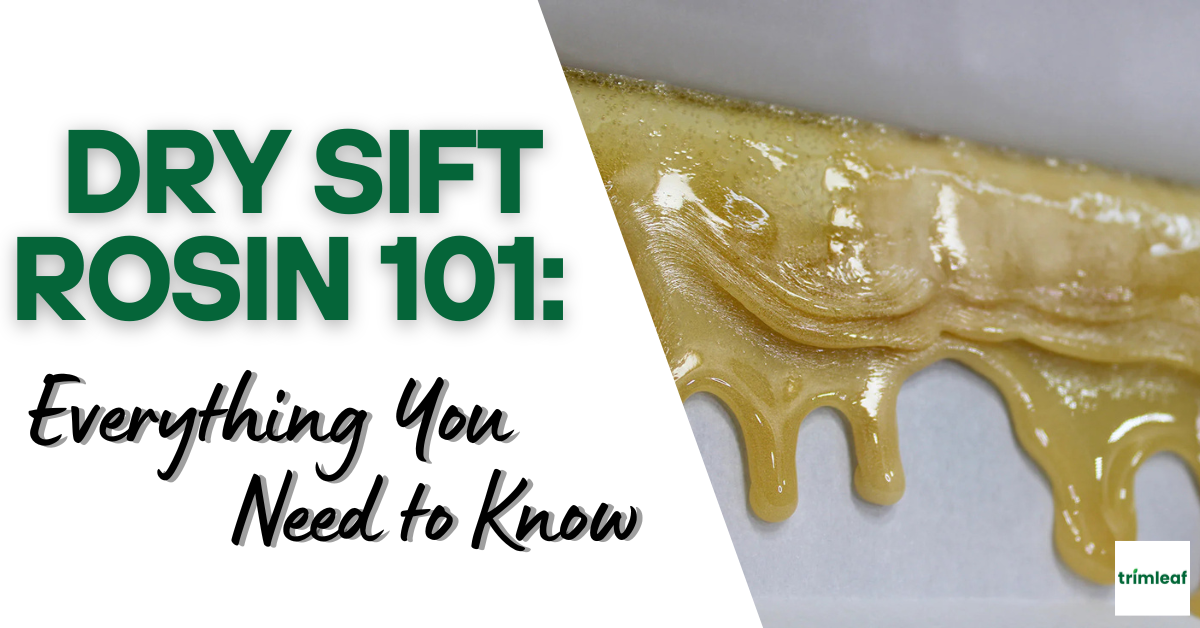
Dry sift rosin is one of the most refined and sought-after solventless cannabis concentrates available today. Created by pressing clean dry sift under heat and pressure, this concentrate preserves the full flavor, aroma, and potency of the cannabis plant, without the use of solvents. In this guide, you’ll learn everything you need to know about dry sift rosin: from the basics of what it is to how to make it and how to optimize your yields for premium-quality extracts.
Table of Contents
- Is Dry Sift the Same as Dry Sift Rosin?
- What Sets Dry Sift Apart From Other Concentrates?
- How to Make Dry Sift
- Pressing Dry Sift into Rosin
- Key Benefits of Dry Sift Rosin
- Maximizing Yield and Quality
- Uses, Benefits, and Market Potential of Dry Sift Rosin
- Conclusion
- Frequently Asked Questions About Dry Sift Rosin
Is Dry Sift the Same as Dry Sift Rosin?
No, dry sift and dry sift rosin are not the same, but they are closely related.

Dry sift is a refined form of kief, also known as the raw material. It's a type of solventless hash made by mechanically separating the trichome heads from dried cannabis using mesh screens or tumblers. The result is a fine, sandy kief-like product rich in cannabinoids and terpenes, but it still contains some residual plant material unless further cleaned.
Dry sift rosin is the next-level product, created by pressing dry sift using heat and pressure. This process extracts the resin—the sticky oils and active compounds—while leaving behind the plant matter. What you get is a pure, potent, and flavorful solventless concentrate that melts cleanly and can be dabbed or used in edibles, vapes, and more.
What Sets Dry Sift Apart From Other Concentrates?
What sets dry sift apart from other concentrates, such as bubble hash or ice water hash, is that no water or solvents are used during the extraction process. It’s a gentle, solventless method that, when done correctly, yields highly potent and flavorful results.
For the best quality, your goal is to isolate trichome heads while minimizing the presence of plant material and contaminants. Static tech (which uses static electricity to attract unwanted debris) is a standard method for cleaning and sifting to achieve optimal purity.
How to Make Dry Sift
Making quality dry sift requires patience, the right equipment, and a cold working environment. Here's a quick step-by-step overview:
Start with high-quality cannabis material—preferably dried and cured buds with abundant resin glands.
Use a dry sift screen setup or micron-rated mesh screens (between 90 μm and 150 μm).
Gently rub or shake the cannabis over the screens in a cool room or with the help of dry ice or liquid nitrogen to help trichomes break off.
For cleaner sift, use static tech methods to remove any unwanted plant material.
Optional: Use commercial tools like the Resinator XL or XLS Pro to automate and scale your process. For top-tier extractors, maintaining the cold chain and using a freeze dryer for post-harvest prep helps preserve cannabinoids and terpenes.
Pressing Dry Sift into Rosin
Now that you've successfully made clean, high-quality dry sift, the next step is unlocking its full potential, and that’s where pressing comes in.
Dry sift on its own is a potent form of hash, but when you press it into rosin, you create a cleaner, more concentrated, and easily dabbable product. The process utilizes heat and pressure to extract the resin, which is rich in cannabinoids and terpenes, while leaving behind impurities such as plant material. The result? A solventless, flavorful concentrate that melts cleanly and hits smoothly.

Pressing dry sift is also an excellent way to preserve strain-specific characteristics while increasing shelf stability and ease of use, making it ideal for both personal consumption and commercial products.
You’ll need:
- A reliable rosin press
- Parchment paper
- Proper temperature and pressure settings
Place dry sift into a folded parchment pouch, ensuring it's evenly spread for consistent pressing.
Heat your rosin press to around 160°F–190°F, depending on your material and desired consistency.
Apply pressure between 300–800 PSI (platen PSI), adjusting based on the press model and quantity of sift.
Press for 45–90 seconds and collect your golden resin once it oozes out onto the parchment paper.
Key Benefits of Dry Sift Rosin
Solventless & Clean
- No hydrocarbons or alcohol—appealing to health-conscious consumers and regulatory markets.
Preserves Terpenes
- Gentle heat and pressure retain more of the strain’s original cannabinoids and terpenes for a richer experience.
Full-Spectrum Effects
- Maintains the plant’s full chemical profile, giving you balanced, entourage-effect-driven results.
Shelf-Stable
- When stored correctly, rosin stays potent for long periods without degrading.
Maximizing Yield and Quality
Here’s how to get the most out of your dry sift rosin production:
- Quality in = quality out. Start with the best cannabis flowers and starting material for rosin.
- Use a micron chart to determine the optimal screen sizes for your specific needs.
- Avoid pressing sift with too much biomass or leftover plant matter, which lowers purity.
- Maintain a clean, cold environment when collecting and storing trichomes.
Dry sift rosin yields can reach up to 60% return from sift, depending on purity and pressing skill. In comparison, flower rosin yields around 10–20%.
Uses, Benefits, and Market Potential of Dry Sift Rosin
Dry sift rosin is more than just a premium dab—it’s one of the most versatile and in-demand forms of solventless cannabis concentrate on the market today. Whether you're a home extractor, product formulator, or commercial grower, this extract offers a range of functional benefits and applications across the cannabis industry.
Practical Uses of Dry Sift Rosin

Because of its purity, potency, and solvent-free composition, dry sift rosin can be incorporated into many cannabis products:
- Dabbing: Its full-spectrum flavor and smooth melt make it ideal for vaporization using dab rigs or pens.
- High-End Edibles: Because it’s already decarboxylated during pressing, it can be infused into butter, oils, or tinctures with minimal processing.
- Vaping: Clean, refined rosin is perfect for loading into vape pens or cartridges, especially for solventless product lines.
- Infused Pre-Rolls or Joints: Add small amounts of rosin to flower rolls to enhance potency and flavor.
- Formulation Ingredient: Blend into live dry sift, full-melt hash, or other concentrates to create custom product lines.
Market Potential and Industry Growth
In a market shifting toward solventless extraction, dry sift rosin is gaining serious traction:
Conclusion
Dry sift rosin is a clean, potent, and versatile cannabis extract that’s perfect for both home producers and commercial artisans. With the right equipment, technique, and patience, you can produce beautiful solventless rosin from high-quality dry sift hash.
Unlike other methods, dry sift rosin enables the preservation of the full spectrum of cannabinoids and terpenes, delivering a flavorful and effective product that appeals to both connoisseurs and health-conscious consumers. With scalable tools and growing market demand, it’s also an increasingly wise investment for cannabis brands and processors.
Frequently Asked Questions About Dry Sift Rosin
- ◄What is dry sift rosin?
- Dry sift rosin is a solventless cannabis concentrate made by pressing cleaned dry sift hash (trichome heads) under heat and pressure. This process produces a pure, potent resin that preserves the full flavor, aroma, and cannabinoid profile of the original cannabis plant—without using solvents or chemicals.
- ◄How is dry sift different from dry sift rosin?
- Dry sift is the unpressed hash—a sandy collection of trichomes separated from cannabis using dry sift screens or tumblers. Dry sift rosin is made by pressing that sift under heat and pressure with a rosin press, extracting the concentrated oils while leaving behind plant matter.
- ◄Why press dry sift into rosin?
- Pressing dry sift transforms it into a more refined, dab-ready concentrate that melts cleanly and offers higher potency. The pressing process removes residual plant particles and yields a stable, flavorful resin ideal for dabbing, vaping, or infusing into edibles.
- ◄What equipment do I need to make dry sift rosin?
- You’ll need:
- High-quality cannabis material
- Dry sift screens or mesh sieves (90–150 µm)
- A rosin press with temperature & pressure controls
- Parchment paper
- Optional: freeze dryer, static tech setup, or Resinator XL for automation
- ◄What temperature and pressure should I use to press dry sift?
- Common settings are:
- Temperature: 160°F–190°F (71°C–88°C)
- Pressure: 300–800 PSI on the platens
- Press time: 45–90 seconds (adjust based on texture & yield)
- ◄What is the yield of dry sift rosin?
- A well-cleaned dry sift can produce 50–60% yield when pressed, depending on its quality. For comparison, flower rosin usually yields around 10–20%. Cleanliness, trichome maturity, and pressing technique all influence output.
- ◄Is dry sift rosin better than bubble hash rosin?
- Not necessarily better—just different. Dry sift rosin is often cleaner-tasting and easier to press, but bubble hash rosin may retain more resin content due to the ice-water process. The best choice depends on your strain, setup, and preference for meltability or terpene preservation.
- ◄Can I use kief instead of dry sift?
- Technically yes, but kief from grinders or trim is usually less pure and contains more plant debris. Dry sift collected using proper screen sizes and static tech yields much better rosin quality.
- ◄How do I store dry sift rosin?
- Store in a cool, dark, airtight container—preferably in the fridge (not the freezer). Exposure to light, heat, and air can degrade cannabinoids and terpenes. Silicone or glass containers work well for short- to medium-term storage.
- ◄Is dry sift rosin legal?
- That depends on your local cannabis laws. In many legal markets, solventless products like dry sift rosin are permitted for sale and personal use. Always verify your region’s extraction and concentrate regulations.




